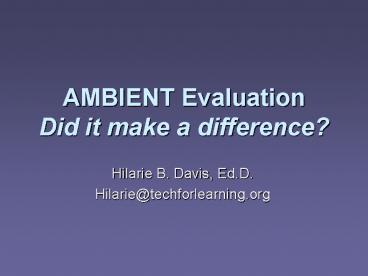AMBIENT Evaluation Did it make a difference? - PowerPoint PPT Presentation
1 / 23
Title: AMBIENT Evaluation Did it make a difference?
1
AMBIENT Evaluation Did it make a difference?
- Hilarie B. Davis, Ed.D.
- Hilarie_at_techforlearning.org
2
What is evaluation?
3
(No Transcript)
4
The problems that exist in the world today cannot
be solved by the level of thinking that created
them. Albert Einstein
5
Problem Based Learning
- The year is 2005 and you find yourself at
University of Miami. You are meeting people from
all over because
6
The Scenario
- You have been selected as an AMBIENT teacher.
You will be learning about how to teach
environmental health.
7
The problem is we need to know what difference
this makes? What is the effect on your teaching
and your students learning?
The Problem
8
Your mission, if you choose to accept it, (which
you have by signing showing up -) is to
The Task
9
The Task Your Mission
- Identify what you and your students need
- Identify the AMBIENT resources to meet those
needs - Describe how you use the resources and who you
will use them with - Plan to measure, describe and report the effect
(evaluate)
10
What questions do you need to answer to use
AMBIENT to make a difference? What do you need
to know to show you made a difference - to
measure the effects of your activities on the
needs?
Self-Assessment
- Think - List your questions (1 min)
- Pair -Share with one other person (2)
- Share with whole group (4)
11
What do you know about evaluation? (3 minutes)
Self-Assessment
- Jot down a definition - individually
- Rate yourself on how comfortable you are 1-4
(most) - Rate yourself on how knowledgeable you are 1-4
12
Step out of your medium
13
If you live in water, you dont notice it because
it is all you know
- Effective evaluation causes you to stop, reflect,
find an audience (not a water dweller) and talk
about what you learned
14
In order to do evaluation, you start with the
goals
- Environmental Health, Toxins, Ethics
- Increase student knowledge
- Increase student interest
- Increase student interest and knowledge in
careers - Increase teachers use of inquiry through
professional development
15
Evaluation is central to Inquiry
- Evaluation makes learning more effective.
- If you know what you need (needs assessment,
pretest), then you are focused on learning. - When you check on what you know (outcomes
assessment, posttest, project analysis), you
reflect on what you know, how you know and its
value, so you consolidate what you learned.
16
The Goal Know, Value and Use Environmental Health
- Pre/post on your knowledge of Env Health
- Your use of AMBIENT
- Your use of inquiry
- Pre/Post on your students knowledge, interest
and careers environmental health
17
Here is a printout of the results of our recent
standardized tests and here are the same results
printed with a very small hard-to-read font, to
make the implications less obvious.
Evaluation is not this!
18
You Have Anonymity and Confidentiality
19
- Not everything that can be counted counts, and
not everything that counts can be counted. --
Albert Einstein
20
Formative - Summative
Write it down, Take Pictures How are we doing?
(formative) Checking in, being honest, critical
friends How far have we come? (summative) Facing
the music - benchmarks for progress, pre/post
21
What is good evidence of effect?
Think Power Reflection Evidence
reflection Evidence reflection
context Evidence reflection context
comparison
Think Quality Self-report - how you think and
feel Products rated on standard rubrics - by
multiple people What, when, where, how and why
you did it, what you think of it, what people
produced Compare peoples results based on if, or
how much they participated
22
(No Transcript)
23
Now what?
- Plan to tell your story (context)
- with evidence - numbers (ratings, tests) and
artifacts (examples with ratings)































